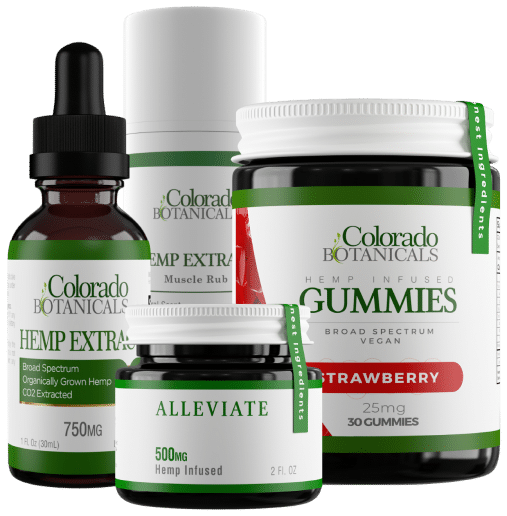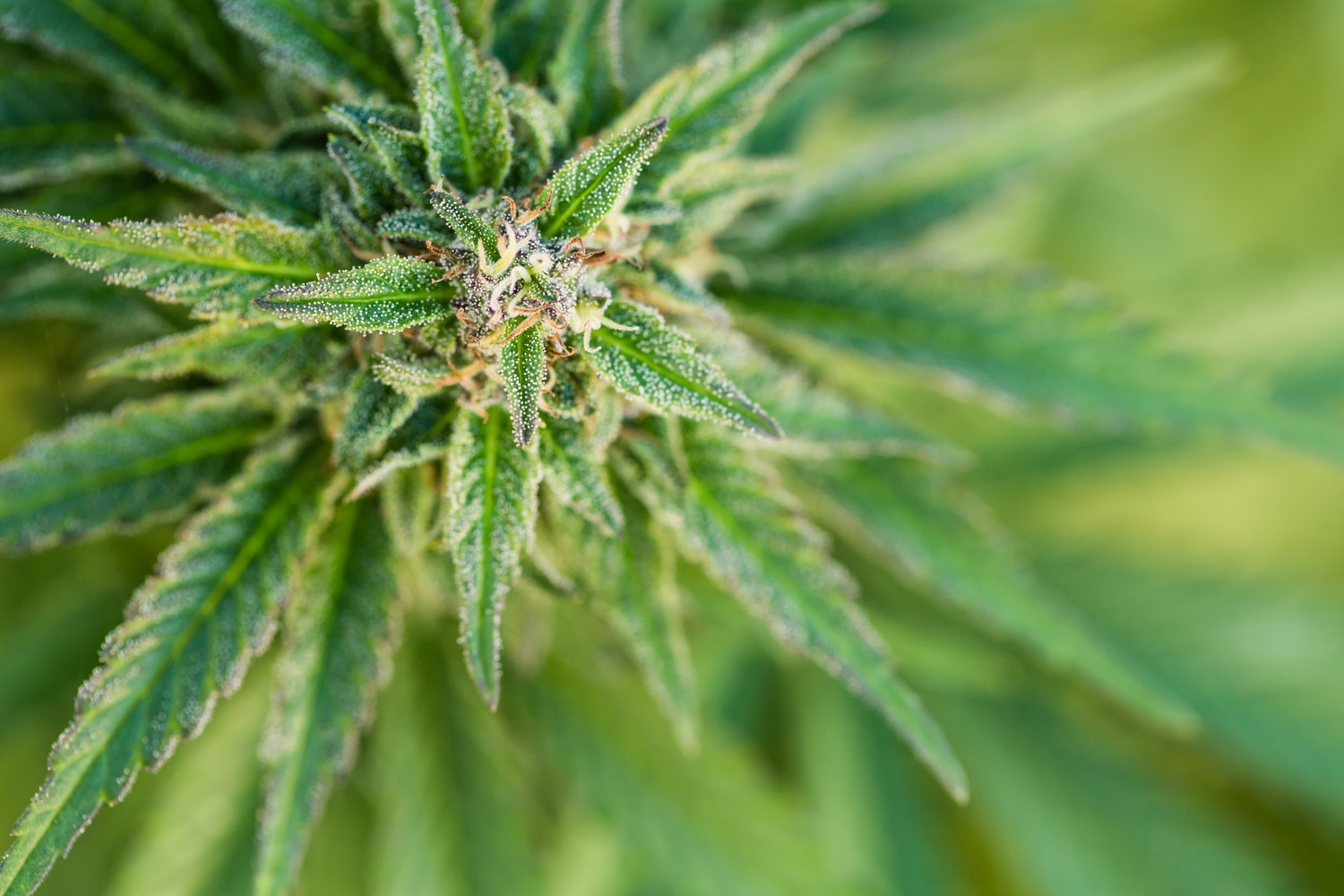CBD is now massively popular with people from all walks of life, but this non-intoxicating cannabinoid hasn’t quite shaken itself off its connection with an intoxicating, illegal plant. What’s the difference between CBD from hemp and CBD from marijuana, and which type of CBD is better to use?
With searches for topics like “hemp-derived CBD verse marijuana-derived CBD” on the rise, it’s time to definitively define the differences between CBD produced using legal hemp and CBD extracted from federally illegal marijuana. In this guide, learn everything you need to know to ensure you’re using the right kind of CBD.
What Is CBD?
CBD is a non-intoxicating cannabinoid naturally found in cannabis. Derived from cultivars of the Cannabis sativa plant that contain less than 0.3% THC, CBD is generally considered an industrial hemp product, placing hemp-derived CBD oil in a very different legal category from marijuana products.
Used primarily to help with pain, depression, anxiety, and sleep, hemp-derived CBD products are sold widely online. As long as they contain less than 0.3% THC, industrial hemp plants are usually considered federally legal, leading to a boom in hemp production across the nation.
What Are Cannabinoids?
Cannabinoids are unique substances only found in cannabis plants. Some cannabinoids, like THC, are intoxicating, but others, like CBD, do not have any profound psychoactive properties.
Most cannabinoids are alike, however, in that they’re being intensively researched for their potential medicinal benefits. Scientists are very interested in determining the natural healing power of cannabinoids, and CBD is at the center of international research into the usefulness of these fascinating substances.
What Is the Difference Between Hemp and Marijuana?
To understand the differences between hemp-derived CBD and marijuana-derived CBD, we must first address the differences between hemp and marijuana. Despite both being members of the cannabis species, hemp and marijuana plants are different both genetically and from a regulatory perspective.
What Is Cannabis?
“Cannabis” is the genus name of an annual herbaceous plant family, the most prominent member of which is Cannabis sativa. Scientists once thought Cannabis indica was a different species entirely, but it’s now widely accepted that the two plants come from the same species.
Similarly, no official species differentiation has been made between cannabis that bears THC and cannabis that bears CBD. Members of the Cannabis sativa species that are rich in CBD have simply been bred that way, and they’re called “hemp” to differentiate them from intoxicating (and often illegal) marijuana.
What Is Marijuana?
“Marijuana” is an outdated regulatory term used to refer to cannabis plants containing more than 0.3% THC. Under the Controlled Substances Act of 1971, marijuana is considered a Schedule I drug, the category carrying the harshest legal penalties and designed only to pertain to substances with no medical properties whatsoever.
CBD products are considered marijuana when they contain over 0.3% THC. While this type of CBD might be legal in states with medical or recreational dispensaries, it is federally illegal.
What Is Hemp?
The term “hemp” refers to cannabis plants that have been determined to have no psychoactive value since they contain less than 0.3% THC. Used to make fiber, food, and even fuel, hemp is a multi-purpose crop that has recently been bred for use in making CBD products.
CBD hemp oil can be sold online and across state lines, unlike marijuana-derived CBD oil. As a result, consumers can now use non-intoxicating forms of cannabis even in states without medical marijuana programs or recreational marijuana markets.
What Is Hemp Seed Oil?
Hemp seed oil is an extract made from hemp seeds, which do not contain CBD or any other cannabinoids. Instead, hemp seed oil is an excellent source of essential nutrients and essential fatty acids.
If you eat hemp seeds, they’re also an excellent source of fiber and protein. No matter how many hemp seeds you eat, though, you won’t get high or experience the benefits of CBD.
Difference Between CBD from Hemp vs. Marijuana
Marijuana-derived CBD and hemp-derived CBD are different, but why, exactly, is marijuana-derived CBD oil illegal while CBD hemp oil isn’t? Is there any reason you’d want to use marijuana-derived CBD oils despite their high THC content? Let’s find out:
Hemp CBD vs. Marijuana CBD
Hemp-derived CBD oil contains less than 0.3% THC, but CBD derived from a marijuana plant will contain considerably more THC than that. Even though CBD appears to partially block the activity of THC, ingesting large concentrations of THC in your CBD oil will still get you high. Plus, using marijuana CBD oil in the wrong part of the country could violate federal or state laws.
Is CBD from Marijuana Better than Hemp?
CBD from marijuana has both advantages and disadvantages. For certain severe medical conditions, some experts might recommend the analgesic properties of THC despite its potential disadvantage of getting you high.
For many CBD consumers, however, THC intoxication provides a disruptive feeling of physical and mental discomfort. Combined with the fact that THC-rich CBD is illegal to buy online and only available through dispensaries in states that have legalized marijuana, the potential advantages of marijuana CBD start to seem insubstantial.
Is CBD from Marjiuana Legal?
No, CBD from marijuana — meaning it contains more than 0.3% THC — is illegal to ship across state lines. Despite certain states moving to create legal medical and recreational marijuana markets, THC remains a federally illicit Schedule I drug, and it’s only allowed in hemp products in concentrations under 0.3%.
Should I Buy CBD Oil from Hemp or Marijuana?
If they’re both considered “cannabis-derived CBD,” why should I buy CBD from hemp instead of CBD from marijuana? Despite the legal difference between hemp and cannabis, a CBD molecule is a CBD molecule, right?
What matters, in this case, is the other molecules accompanying CBD. While the presence of minor cannabinoids strengthens the benefits of CBD, one particular cannabinoid — THC — should be kept low for both regulatory and safety reasons.
Whatever else it might be, THC is an intoxicating drug that not everyone who likes CBD wants to use. The less THC and the more CBD your CBD oil contains, the more legal it will be, and the more you’ll like its effects if you don’t enjoy getting high.
CBD Isolate vs. Full Spectrum CBD
You now know the difference between the type of hemp CBD you can buy online and the cannabis CBD you can buy in a recreational marijuana market, but there’s one more subtlety we should tease out before we finish. Even within the online hemp CBD market, there are different types of CBD to choose from, and chief among your options are isolate and full-spectrum CBD.
At the cost of not including any minor cannabinoids or terpenes whatsoever, isolate CBD consists entirely of the CBD molecule and does not contain any detectable traces of THC. The various cannabinoids present in cannabis work synergistically together, though, leading to the rising popularity of full-spectrum CBD.
Full-spectrum CBD can contain up to 0.3% THC, which isn’t enough to get you high but may strengthen the benefits of the entourage effect. It’s now even possible to extract CBD in a way that leaves the THC behind but keeps terpenes and other minor cannabinoids intact — try broad-spectrum CBD for the best of both worlds.
Summary of the Difference Between CBD Oil from Hemp vs. Marijuana
CBD derived from the hemp plant is usually legal wherever you are in the country, while CBD derived from marijuana is often illegal. Hemp CBD won’t get you high, but marijuana CBD might. In the end, those are the two most important differences between these two very dissimilar types of CBD.
One other factor worth mentioning is how much easier it is to get hemp CBD. Anytime you want to try a new CBD product, simply head to the internet and purchase a product that will be at your door in a few days. In most places, buying marijuana CBD involves going to a dispensary in person only to pick through a few meager options — some of which you could have just bought online anyway.
Unless you have a serious medical condition and you’ve been recommended marijuana CBD by a doctor, there’s no real reason to venture beyond the world of hemp CBD. It’s non-intoxicating, more legal, and easier to get — what is there to lose?









